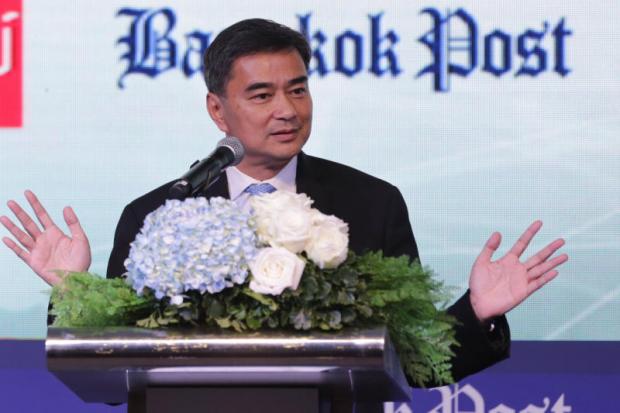
To make the country more competitive, the next government must decentralise and devolve state power to more local levels, giving people more say in political decision-making, says Democrat Party leader Abhisit Vejjajiva.
"If you look at news headlines now, none of these issues [of power decentralisation] are talked about much by political parties. Many only focus on forming coalitions or allocating poll candidates to other parties. This is not the landscape we want to see," Mr Abhisit, also a former prime minister, said yesterday at the "Bangkok Post International Forum 2018: The New Political Landscape of Thailand".
He said Thailand faces many challenges such as an ageing society, economic inequality and technological disruption so the country needs effective policies to deal with these problems.
Mr Abhisit urged the next government -- expected to come to power after the election next year -- to empower private companies, especially in the IT sector, by eliminating outdated regulations which prevent them from providing new services and products.
"Politicians need to understand we now live in a post-industrial world where everything changes really fast. If we do not change the political landscape to one in which everyone competes to create policies and remove outdated regulations to solve the problem, it will be difficult for the country to compete," he said.
Mr Abhisit said the world is now in an era where state control is less needed. Governments in the new era, he said, need to empower the private sector, which has the potential and tools to grow.
"It's like you say you want to reform our education system, but every school still needs to wait for orders from the Education Ministry. This is not going to work. Schools should be able to decide on what they want to do with the budget they receive from the government," he said.
The Democrat Party leader also said political parties should use more social media and digital technology to listen to and communicate with people, so they can understand the problems and come up with policies that really reflect the needs of the people.
"People know more about their problems. We must allow them to play a bigger part in political decision-making. This is what I want to see in the new political landscape," he said.
Mr Abhisit also said the Democrat Party now has clear differences in policies: First, the party believes in democracy; secondly, it believes in decentralisation; and thirdly it thinks a new paradigm is needed for economic management.
Mr Abhisit said decentralisation of power to the provinces is necessary to help reduce inequality between regions.
"We still have a few months to work on this and then voters will decide who they want to run the country," he said.